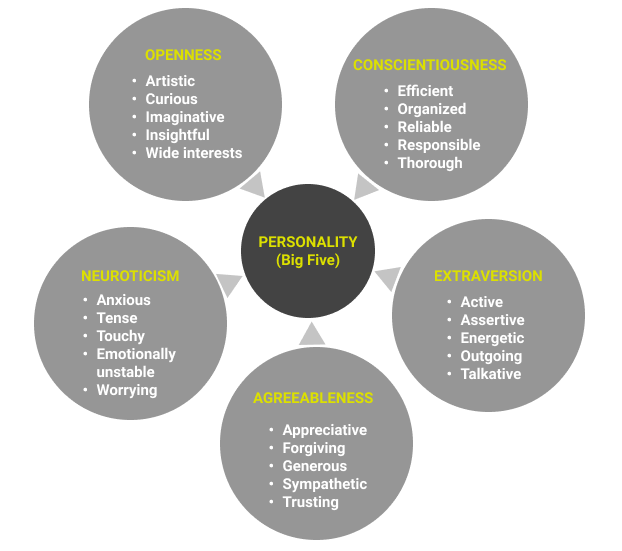It’s been a few months since the last newsletter but I’m excited to say that The Brainlift is back and better than ever! After some important feedback from readers, I’ll be publishing more regularly and introducing three important changes: more science, more depth, and more input from leading researchers around the world. Thanks to all of you who have stuck around—I’m confident you’ll like the updated format, and feedback is always welcome.
How to measure personality
Social media is filled with fun but unreliable personality tests. Some are purely for entertainment like “Which Disney character are you?” or “What’s your spirit animal?” (beware of privacy and security concerns with these quizzes). Others like Myers-Briggs look more scientific but are still dubious.
Not all personality tests are useless though. The Big Five assessment (also known as the OCEAN assessment) is backed by a lot of evidence and used widely in the sciences. It was created by asking large numbers of people about their attitudes and behaviors, and then using statistics to infer a few core traits that consistently explained their answers. Here’s a graphic I created to show you the five traits as they’re typically used today.
Now you can see why “OCEAN” works as a mnemonic: Openness, Conscientiousness, Extraversion, Agreeableness, and Neuroticism (by the way, I took the words describing each trait from this seminal paper, which you can read if you want a really detailed insight into the Big Five assessment and its history).
If you want to measure your own personality, you can try a short version of the Big Five personality assessment at this link (note that neuroticism is sometimes labeled as “emotional stability” which is the mirror image of neuroticism: high emotional stability is low neuroticism). Before you do the test, you might find it interesting to guess how high/low you’ll score on each of the traits and ask a friend to do the same for you. If you find differences between your ratings, you can see whose expectations were closer to the test results. It’s possible that your friends know you better than you know yourself.
Personality predicts health
Your scores on the Big Five personality traits predict important life outcomes including job performance, academic performance, and resilience. That doesn’t mean job interviews should include personality assessments, since there are other more important predictors of job performance (e.g. skills, experience, knowledge, etc). But it does mean that personality is a meaningful psychological construct when measured properly.
Perhaps most importantly, we’ve known for a while that personality (especially conscientiousness) predicts health across the lifespan. And we’re now beginning to learn why.
Last month (April 2021), a group of US researchers published a paper looking into why particular personality traits predict health. They tested whether reactions to daily stressors could explain the relationship.
The team used data from a 20-year nationwide survey of more than 1000 American adults. Questions assessed personality, daily stressors, and health-related outcomes, and data was collected in three waves that were each 10 years apart: 1) in the mid-1990s, 2) in the mid-2000s, 3) in the mid-2010s.
Two personality traits correlated with health outcomes. High conscientiousness in the 1990s (first wave of data) predicted better physical health 20 years later (third wave of data). And high neuroticism predicted worse physical health. But both links were mediated by what the researchers called “negative affect reactivity”: how much worse people felt on days with stress vs without stress.
Even measured across decades, people who were highly conscientious saw daily stressors as less of a big deal; they believed they could handle them just fine and were quicker to bounce back after experiencing a stressful event. In contrast, highly neurotic people saw daily stressors as a bigger personal threat and tended to cope poorly with them. These two ways of reacting to stress drove the different personality-dependent health outcomes: more negative affect reactivity produced worse health, and less negative affect reactivity produced better health.
The takeaway
If you’re high in neuroticism or low in conscientiousness, pay attention to how you react to the stressors in your life. Some of us have more serious stressors to deal with than others, but all of us can learn to cope better. And better coping may help to buffer higher-risk personalities from health problems. Here are a few ways to work toward less reactivity in response to stressors:
Practice seeing stressors as a challenge to overcome rather than a threat to avoid.
Set clear plans for dealing with the common stressors in your life before they happen, so that you’re better prepared when they do.
If you often feel anxious, start taking notes about what is making you anxious in the moment. Journaling is a good way to see the problems in your life more clearly so that you can be more proactive and organized (i.e. conscientious) in developing coping strategies.
Personality often appears to be stable throughout adulthood, but that doesn’t mean that active intervention strategies can’t make a difference. In fact, in my next newsletter, I’ll talk about a fascinating new study that tests how you can directly alter your personality in any direction you choose.
A final quote
“A good character is the best tombstone. Those who loved you, and were helped by you, will remember you when forget-me-nots are withered. Carve your name on hearts, and not on marble.”
~ Charles Spurgeon
If you enjoyed this, please share it with a few friends. If you’re new here, sign up below or visit erman.substack.com
I love to hear from readers. Reach out any time with comments or questions.
Until next time,
Erman Misirlisoy, PhD
Like The Brainlift on Facebook
Follow me on Twitter
Follow me on Instagram
Follow me on Medium
Connect on Linkedin




